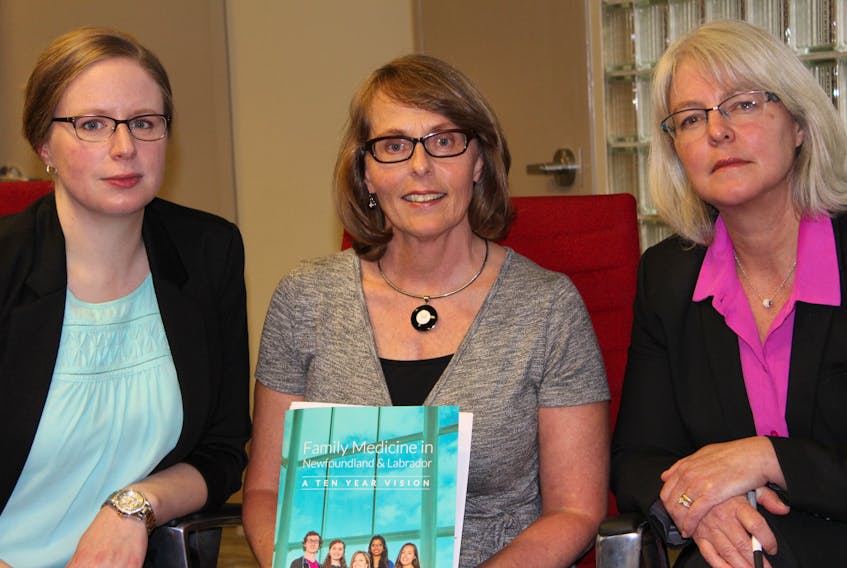Family doctors in Newfoundland and Labrador want a new payment model.
It’s part of a 10-year vision for family medicine released Tuesday by the Newfoundland and Labrador Medical Association (NLMA), the College of Family Physicians and Memorial University’s school of family medicine.
A new payment model will allow doctors to spend quality time with patients who have complex conditions, they say.
Family doctors are currently paid per patient visit, which goes against spending time with patients with complex needs.
About 65 per cent of the doctors in the province work on fee for service, while the remaining doctors are salaried.
The new model for family doctors would be a blend — a base salary and some fee for service. And that, say the three organizations, would allow doctors to slow down their interactions with patients.
At the same time, overhead expenses for their practices continue to rise.
The vision document notes fee-for-service, community-based family physicians spend, on average, one-third of their income, or $82,496 annually per physician, on overhead expenses. These costs are higher in rural areas — an average $94,532 compared to $76,556 in urban areas.
Meanwhile, fee-for-service physicians receive no sick leave benefits, no annual leave pay, no health or dental benefits, no life insurance, no employment insurance benefits and no pension plan, they noted in their vision document.
They also want a respectful relationship with the government, something they say is lacking now, despite the fact the Department of Health is headed by Dr. John Haggie, a retired surgeon who served as a past-president of both the NLMA and the Canadian Medical Association.
“We had hoped we would have a good working relationship with him, but unfortunately that hasn’t quite happened and there’s been some comments made by the minister of Health during the past year that have offended the family physicians of our province and physicians in general,” NLMA president Dr. Lynn Dwyer said at a Tuesday news conference.
The document outlining the vision says family doctors feel undervalued by the government, and say income and benefits have been cut “without warning or justification.”
Among them was the de-listing of the flu shot from the fee schedule.
Overall, the organizations say their plan sets a tone for a new day in family medicine, and therefore a better outcome for patients and the province’s health care system.
“Family medicine in this province is at a crossroads,” Dwyer said. “Our system is not prepared to meet the increasing demands of an aging, sick population with complex medical needs.”
There are 50,000 people in the province without a family doctor. A recent poll commissioned by the NLMA concluded that number could be even higher — 13 per cent of the population as opposed to 10 per cent.
At the same time, the demographic realities show many doctors and patients are aging, meaning potentially fewer doctors to deal with sicker people.
The organizations say they want to work with the government to come up with a plan.
Currently it’s not even known how many family doctors the province needs, as there is no human resource strategy related to the field.
“At Memorial, we focus on training family medicine students and residents in a distributed manner to assist with the recruitment and retention of comprehensive family physicians serving the needs of the people of Newfoundland and Labrador,” said Dr. Katherine Stringer, chairwoman of family medicine at Memorial University. “The best outcomes for patients occur when they have long-term relationships with their family physicians. We want to build a better health system in which our graduates can practice as they have been trained and every citizen will have access to a family physician as part of the primary care team they require.”
Dr. Nicole Stockley, president of the college of family physicians, said she began practising family medicine two years ago and one of her first patients had had a heart attack, suffered chronic obstructive pulmonary disease and had diabetes, but had not been followed by a family doctor in 20 years.
While trained to work in teams, she found herself wishing for, but not having, the support of a team with a social worker and pharmacist and other professionals.
At the same time, she had a tight schedule of patients.
“We are proud to present this vision paper in partnership with both the NLMA and the discipline of family medicine, Memorial University of Newfoundland. We are confident that it outlines many of the issues confronting our family physicians, and provides a roadmap for the future of patient-centered primary care in Newfoundland and Labrador,” Stockley said.
Part of the 10-year plan is to adopt goals similar to that of the College of Family Physicians of Canada (CFPC) prescription for primary health care renewal, called The Patient’s Medical Home.
Right now, though, while teams exist in the province — one area being Bonavista — the plan for integrating physicians in those teams hasn’t been spelled out or negotiated, the organizations said Tuesday.
Retaining medical graduates long term is another huge issue noted in the vision document.
The faculty of medicine at Memorial University prioritizes training family doctors for practice in rural communities and has been recognized by the Society of Rural Physicians of Canada, which gave the family medicine program its seventh Keith Award in 2018, for producing the largest number of graduates practising in rural areas 10 years after graduation.
However, in 2016, Newfoundland and Labrador had the highest net out-migration of family physicians of any province; 4.2 per cent of family doctors in 2015 had moved to another province in 2016.
Stringer said retaining graduates of the MUN medical program is the best way to reduce turnover. Workload and the perception of an unfavourable climate can be a turnoff, she said.
The number of students choosing family medicine is already lower than the national average — 44 per cent as opposed to 50 per cent.
Some other aims of the 10-year vision:
• That within 10 years all family physicians who want to adopt electronic medical records (EMRs) in their practice are using the provincial EMR, and that all physicians in the province are using the provincial electronic health record HEALTHeNL when appropriate. The provincial EMR’s functionality should incorporate prescribing, referrals, e-consult and patient portals. The EMR should be used to link primary health care teams so patient information can be used within the circle of care. The data from EMR should also be used to create a system of peer comparison and learning.
• That within 10 years, indicators for measuring resource utilization in the primary health care system in Newfoundland and Labrador attain a record better than the national average for eliminating unnecessary care in Canada.
• That within one year a recruitment and retention study will be completed to produce recommendations for ensuring the tools and tactics for recruiting and retaining doctors rival the best in Canada.
• That within one year Memorial University, including clinical faculty, will review and advocate for the necessary resources to deliver a nationally accredited family medicine education program.
The organizations met with the Opposition and the deputy minister of Health on Tuesday prior to releasing their vision, and say they have a meeting with Haggie Wednesday night.
Twitter: BarbSweetTweets









